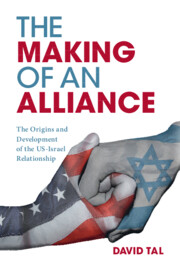Book contents
- The Making of an Alliance
- The Making of an Alliance
- Copyright page
- Dedication
- Contents
- Acknowledgements
- Introduction
- 1 The Sources of the American Support for Zionism
- 2 Friendship
- 3 Friendly Impartiality, 1949–1958
- 4 Strategic Change, 1958–1968
- 5 From Friendship to Strategic Alliance, 1969–1989
- 6 Friendship and Strategic Alliance
- Conclusion
- Bibliography
- Index
4 - Strategic Change, 1958–1968
Published online by Cambridge University Press: 23 December 2021
- The Making of an Alliance
- The Making of an Alliance
- Copyright page
- Dedication
- Contents
- Acknowledgements
- Introduction
- 1 The Sources of the American Support for Zionism
- 2 Friendship
- 3 Friendly Impartiality, 1949–1958
- 4 Strategic Change, 1958–1968
- 5 From Friendship to Strategic Alliance, 1969–1989
- 6 Friendship and Strategic Alliance
- Conclusion
- Bibliography
- Index
Summary
The 1958 Middle East crisis led to a change in the relations between the United States and Israel. The Eisenhower administration looked at Israel as a strategic ally in a region that fell under the sway of the Soviet Union. Hesitantly, the seeds for strategic cooperation between the two nations were being sown. The deepening strategic ties between the two nations led the American recognition that the Arab–Israeli conflict was conflated with the Cold War. Consequently, the United States recognized that Israel needed arms in order to maintain its strength whilst facing an Arab military challenge due to the Soviet military support for the Arab states. In a gradual process that began with President Eisenhower and culminated with President Lyndon Johnson, the United States became Israel’s main arm supplier. The 1967 June War further deepened the attachment between the two nations. Evangelicals cherished what they saw as the fulfilment of the prophecies about the restoration of the Jewish state, and the American people and politicians viewed the Israeli victory as additional proof of the Israelis’ high spirit and capabilities, especially when compared to the failing war in Vietnam. For Israel, which came to control more territories, the war provided an additional opportunity to deliver its messages to the United States through tourism diplomacy. The war also forced Israel to contemplate its place in the Middle East, with peace becoming a more plausible option.
Keywords
- Type
- Chapter
- Information
- The Making of an AllianceThe Origins and Development of the US-Israel Relationship, pp. 94 - 167Publisher: Cambridge University PressPrint publication year: 2022

